Web scraping
with Python
Philo van Kemenade - @phivk
General Assembly London
Recap
Lists
Dictionaries
Recap
Recap
Homework
This workshop
Crypto converter
Your project
these slides
Data on the web
Structured in databases
- structured and indexed
- hidden on the server-side of a web platform
- may be accessible via API (Application Programming Interface)
-
different structure for every page
- available in your browser
- extractable by scraping
Web Scraping
Extracting data from a web page’s source
For example: http://isitweekendyet.com/
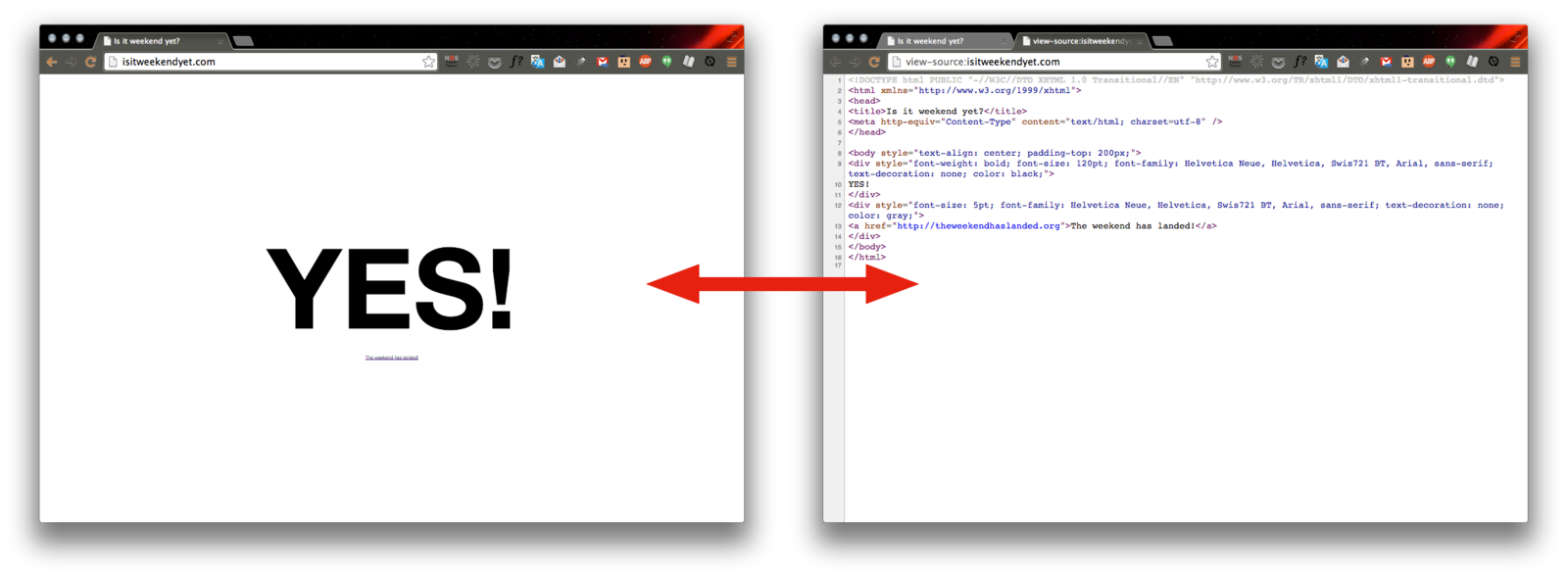
Pseudo code
- Read page HTML
- Parse raw HTML string into nicer format
- Extract what we’re looking for
- Process our extracted data
- Store/print/action based on data
0. Determine what you're looking for


& where it lives on the page
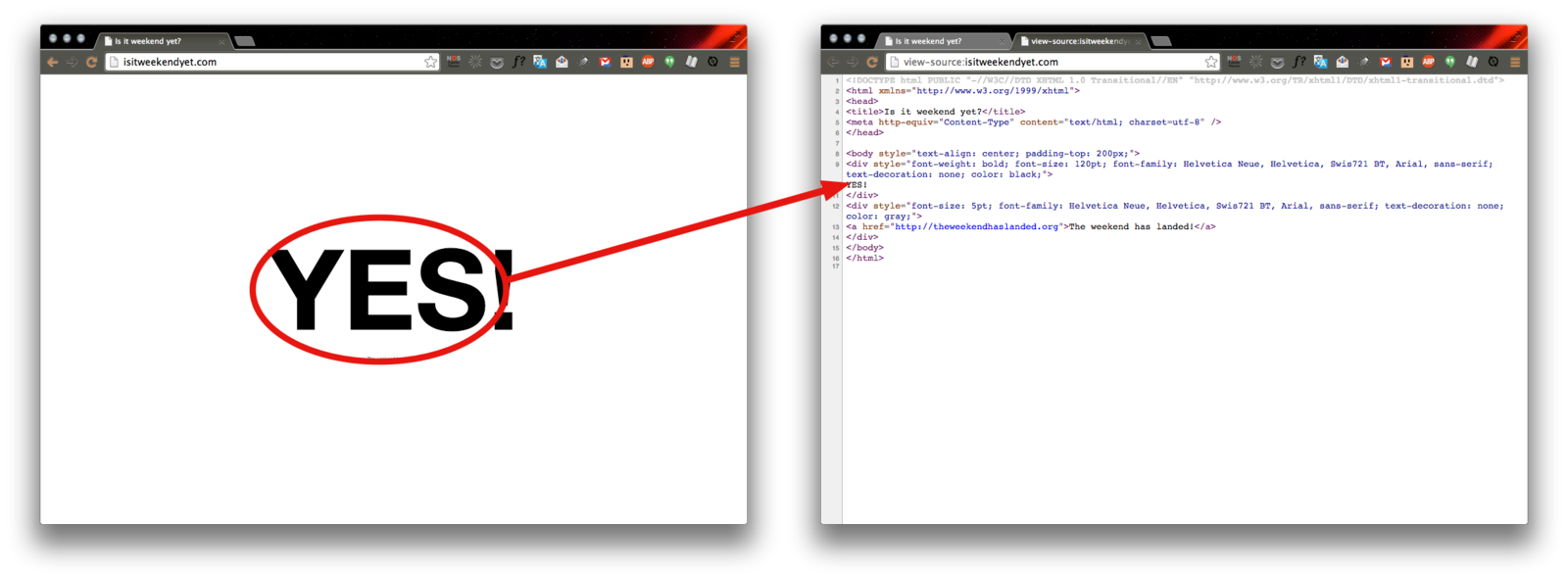
Pro Tip: use your browser's inspector
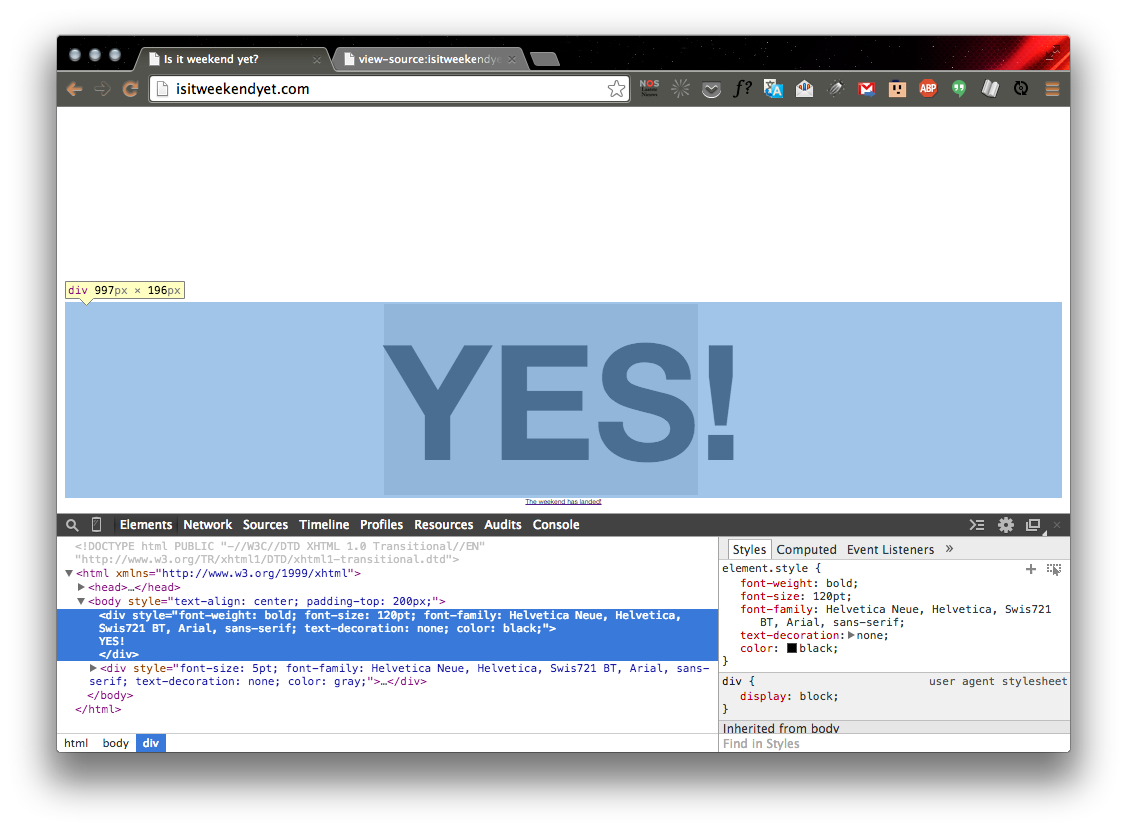
1. Read page HTML
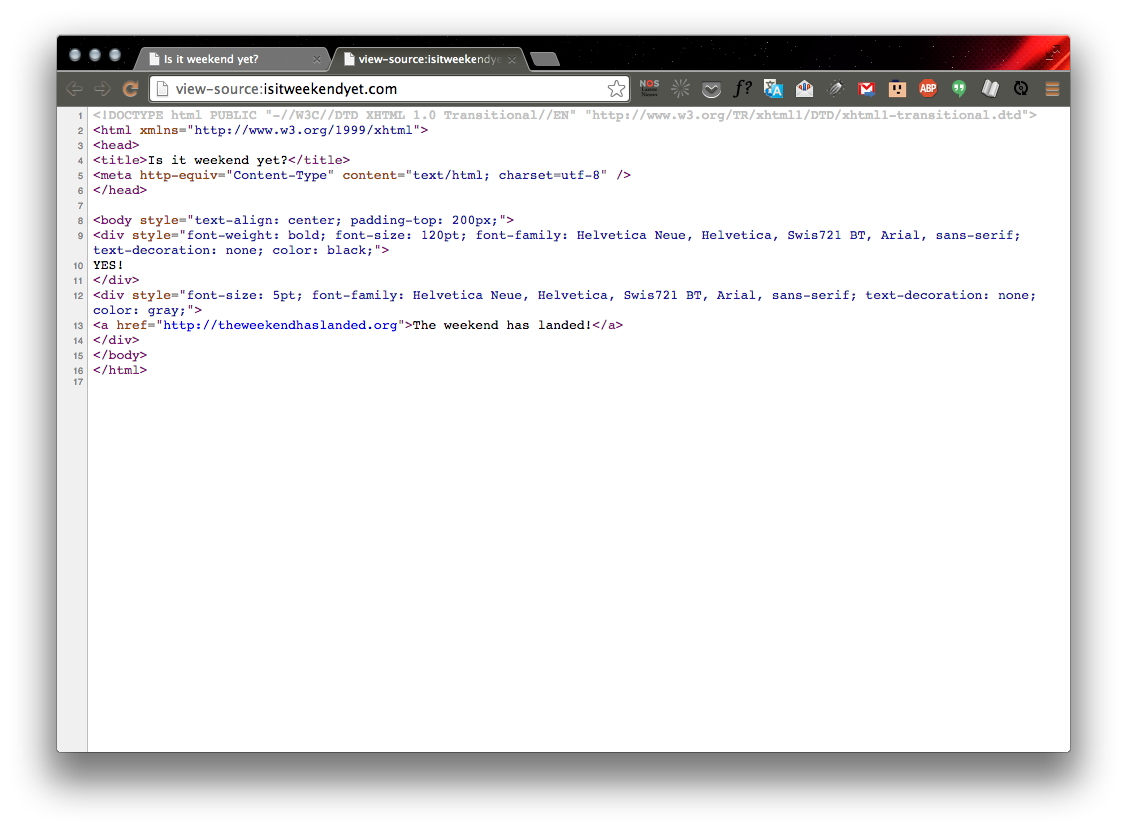
from urllib.request import urlopen
url = 'http://isitweekendyet.com/'
pageSource = urlopen(url).read()
2. Parse from Page to soup
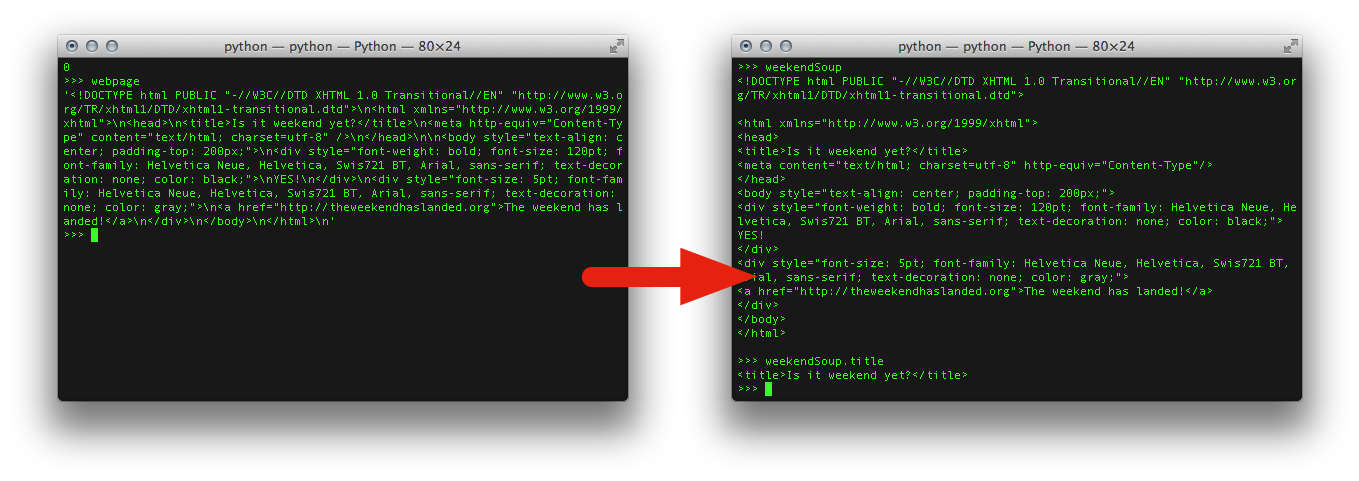
Beautiful Soup
You didn't write that awful page. You're just trying to get some data out of it. Beautiful Soup is here to help. Since 2004, it's been saving programmers hours or days of work on quick-turnaround screen scraping projects.http://www.crummy.com/software/BeautifulSoup/
Powered by Beautiful Soup

2. Parse from Page to soup
from bs4 import BeautifulSoup
weekendSoup = BeautifulSoup(pageSource, "html.parser")
Now we have easy access to stuff like:

>>> weekendSoup.title
<title>Is it weekend yet?</title>
The Shape of HTMl?
The Shape of HTMl
Objects in Soup
Tag
>>> tag = weekendSoup.div
>>> tag
<div style="font-weight: bold; font-size: 120pt; font-family: Helvetica Neue, Helvetica, Swis721 BT, Arial, sans-serif; text-decoration: none; color: black;">
YES!
</div>
>>> type(tag)
<class 'bs4.element.Tag'> String
>>> tag.string
u'\nYES!\n'
>>> type(tag.string) <class 'bs4.element.NavigableString'>
.
3. Extract what we’re looking for
Navigating the parsed HTML tree
Search functions
Bonus: CSS Selectors
Navigating the Soup Tree
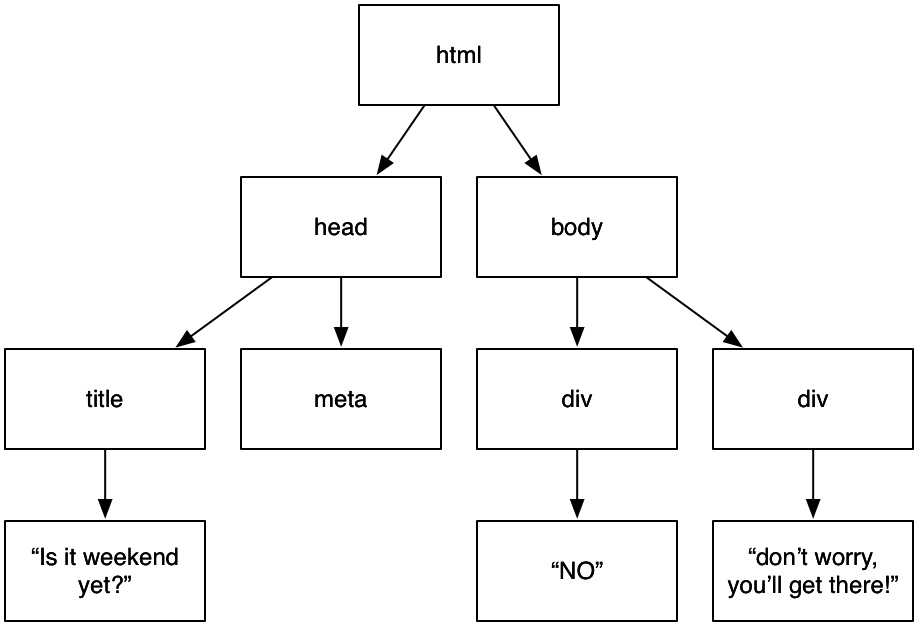
Navigating the Soup Tree
. tagName.contents & .children
.descendants
.parent & .parents
 .next_sibling(s)
.next_sibling(s)
.previous_sibling(s)



Going Down the Tree
>>> weekendSoup.title
<title>Is it weekend yet?</title>
Going Down the Tree
>>> weekendSoup.title.string
'Is it weekend yet?'
more below for reference...
Going Down the Tree
>>> for ss in body.div.stripped_strings:
print(ss)
...
YES!
Going Down the Tree
>>> bodyTag = weekendSoup.body
>>> bodyTag.contents
[u'\n', <div class="answer text" id="answer" style="font-weight: bold; font-size: 120pt; font-family: Helvetica Neue, Helvetica, Swis721 BT, Arial, sans-serif; text-decoration: none; color: black;">
YES!
</div>, u'\n', <div style="font-size: 5pt; font-family: Helvetica Neue, Helvetica, Swis721 BT, Arial, sans-serif; text-decoration: none; color: gray;">
<a href="http://theweekendhaslanded.org">The weekend has landed!</a>
</div>, u'\n']
<div class="answer text" id="answer" style="font-weight: bold; font-size: 120pt; font-family: Helvetica Neue, Helvetica, Swis721 BT, Arial, sans-serif; text-decoration: none; color: black;">
YES!
</div>
<div style="font-size: 5pt; font-family: Helvetica Neue, Helvetica, Swis721 BT, Arial, sans-serif; text-decoration: none; color: gray;">
<a href="http://theweekendhaslanded.org">The weekend has landed!</a>
</div>
Going Down the Tree
>>> for d in bodyTag.descendants: print d...
<div class="answer text" id="answer" style="font-weight: bold; font-size: 120pt; font-family: Helvetica Neue, Helvetica, Swis721 BT, Arial, sans-serif; text-decoration: none; color: black;">
YES!
</div>
YES!
<div style="font-size: 5pt; font-family: Helvetica Neue, Helvetica, Swis721 BT, Arial, sans-serif; text-decoration: none; color: gray;">
<a href="http://theweekendhaslanded.org">The weekend has landed!</a>
</div>
<a href="http://theweekendhaslanded.org">The weekend has landed!</a>
The weekend has landed!
Going Up the Tree
>>> soup.a.parent.name
u'div'
>>> for p in soup.a.parents: print p.name
...
div
body
html
[document]
Going Sideways
>>> weekendSoup.div.next_sibling
u'\n'
>>> weekendSoup.div.next_sibling.next_sibling
<div style="font-size: 5pt; font-family: Helvetica Neue, Helvetica, Swis721 BT, Arial, sans-serif; text-decoration: none; color: gray;">
<a href="http://theweekendhaslanded.org">The weekend has landed!</a>
</div>
Exercise
write a script:
Use Beautiful Soup to navigate to the answer to our question:
Is it weekend yet?
'''A simple script that tells us if it's weekend yet'''
# import modules
from urllib.request import urlopen
from bs4 import BeautifulSoup
# open webpage
# parse HTML into Beautiful Soup
# extract data from parsed soup
# print answer
Searching the Soup-Tree
Using a filter in a search function
to zoom into a part of the soup
String Filter
find by element name
>>> weekendSoup.find_all('div')
[<div style="font-weight: bold; font-size: 120pt; font-family: Helvetica Neue, Helvetica, Swis721 BT, Arial, sans-serif; text-decoration: none; color: black;">
NO
</div>, <div style="font-size: 5pt; font-family: Helvetica Neue, Helvetica, Swis721 BT, Arial, sans-serif; text-decoration: none; color: gray;">
don't worry, you'll get there!
</div>]
Search Functions
find_all()
find()
using Find_all()
find_all( name of tag )
find_all( attribute filter )
find_all( name of tag, attribute filter)
Tag name
>>> weekendSoup.find_all('div')
[<div style="font-weight: bold; font-size: 120pt; font-family: Helvetica Neue, Helvetica, Swis721 BT, Arial, sans-serif; text-decoration: none; color: black;">
NO
</div>, <div style="font-size: 5pt; font-family: Helvetica Neue, Helvetica, Swis721 BT, Arial, sans-serif; text-decoration: none; color: gray;">
don't worry, you'll get there!
</div>]
attribute filters
urlBooks = 'http://books.toscrape.com/'
pageSourceBooks = urlopen(urlBooks).read()
booksSoup = BeautifulSoup(pageSourceBooks, "html.parser")
soumissionLinks = booksSoup.find_all(
'a',
href='catalogue/soumission_998/index.html'
)
books = booksSoup.find_all('article', class_='product_pod')be careful to use "class_" when filtering based on class name
Find()
>>> booksSoup.find('title')
<title>
All products | Books to Scrape - Sandbox
</title>
find_all() returns a list
Search All the directions!



Exercise
How many projects on (the first page of) the Book Store
have a 1 star rating?
pro tip: use a search function
Bonus:
can you get the count for each of the different ratings?
same Template
'''A simple script that scrapes book ratings'''
# import modules
from urllib.request import urlopen
from bs4 import BeautifulSoup
# open webpage
# parse HTML into Beautiful Soup
# extract data from parsed soupBonus: using Css Selectors
soup.select("#content")soup.select("div#content")
soup.select(".byline")soup.select("li.byline")
soup.select("#content a") soup.select("#content > a") Bonus: using Css Selectors
soup.select('a[href]')
soup.select('a[href="http://www.theguardian.com/profile/brianlogan"]')soup.select('a[href^="http://www.theguardian.com/"]')
soup.select('a[href$="info"]')
[<a class="link-text" href="http://www.theguardian.com/info">About us,</a>, <a class="link-text" href="http://www.theguardian.com/info">About us</a>]
>>> guardianSoup.select('a[href*=".com/contact"]')
[<a class="rollover contact-link" href="http://www.theguardian.com/contactus/2120188" title="Displays contact data for guardian.co.uk"><img alt="" class="trail-icon" src="http://static.guim.co.uk/static/ac46d0fc9b2bab67a9a8a8dd51cd8efdbc836fbf/common/images/icon-email-us.png"/><span>Contact us</span></a>]4. Process extracted data
we generally want to:
clean up
calculate
process
Cleaning up + processing
>>> answer = soup.div.string
>>> answer
'\nNO\n'
>>> cleaned = answer.strip()
>>> cleaned
'NO'
>>> isWeekendYet = cleaned == 'YES'
>>> isWeekendYet
False many useful string methods: https://docs.python.org/3/library/stdtypes.html#string-methods
5. Do stuff with our extracted data
# print info to screen
print('Is it weekend yet? ', isWeekendYet)
or save to .csv file
import csv
with open('weekends.csv', 'w', newline='') as csvfile:
weekendWriter = csv.writer(csvfile)
weekendWriter.writerow(weekendYet)
https://docs.python.org/3.3/library/csv.html
Mini Project

Mini Project
Build a BitCoin to GBP converter
Get the current BitCoin/GBP exchange rate via
use the input() function to get a user's input
(let the slides help you)
⬇️ see template ⬇️
All together Now
'''A simple script that ... '''
# import modules
from urllib.request import urlopen
from bs4 import BeautifulSoup
# open webpage
url =
pageSource =
# parse HTML into Beautiful Soup
mySoup =
# extract data from soup
# clean up data
# process data
# action based on data
Questions?
Useful Resources
google; “python” + your problem / question
python.org/doc/; official python documentation, useful to find which functions are available
stackoverflow.com; huge gamified help forum with discussions on all sorts of programming questions, answers are ranked by community
codecademy.com/tracks/python; interactive exercises that teach you coding by doing
wiki.python.org/moin/BeginnersGuide/Programmers; tools, lessons and tutorials
Useful Modules etc
Thank you
Navigating to the weekend yet answer
>>> from urllib.request import urlopen
>>> from bs4 import BeautifulSoup
>>> url = "http://isitweekendyet.com/"
>>> source = urlopen(url).read()
>>> soup = BeautifulSoup(source)
>>> soup.body.div.string
'\nNO\n'
# an alternative:
>>> list(soup.body.stripped_strings)[0]
'NO'
Book Store
'''A simple script that scrapes info about Books'''
# import modules
from urllib.request import urlopen
from bs4 import BeautifulSoup
# open webpage
urlBooks = "http://books.toscrape.com/"
pageSourceBooks = urlopen(urlBooks).read()
# parse HTML into Beautiful Soup
booksSoup = BeautifulSoup(pageSourceBooks, "html.parser")
# extract data from parsed soup
booksOneStar = booksSoup.find_all('p', class_="star-rating One")
oneStarCount = len(booksOneStar)
print(oneStarCount)
#########
# Bonus #
#########
# simple approach
books1StarCount = len(booksSoup.find_all('p', class_="star-rating One"))
books2StarCount = len(booksSoup.find_all('p', class_="star-rating Two"))
books3StarCount = len(booksSoup.find_all('p', class_="star-rating Three"))
books4StarCount = len(booksSoup.find_all('p', class_="star-rating Four"))
books5StarCount = len(booksSoup.find_all('p', class_="star-rating Five"))
print("1 star: ", books1StarCount)
print("2 star: ", books2StarCount)
print("3 star: ", books3StarCount)
print("4 star: ", books4StarCount)
print("5 star: ", books5StarCount)
# more elegant approach
def getStarCount(booksSoup, starClass):
booksWithStarClass = booksSoup.find_all('p', class_="star-rating "+starClass)
starCount = len(booksWithStarClass)
return starCount
starClasses = ["One", "Two", "Three", "Four", "Five"]
starCounts = {}
for starClass in starClasses:
starCount = getStarCount(booksSoup, starClass)
starCounts[starClass] = starCount
print(starCounts)
'''A simple script that scrapes info about Books'''
# import modules
from urllib.request import urlopen
from bs4 import BeautifulSoup
# open webpage
urlBooks = "http://books.toscrape.com/"
pageSourceBooks = urlopen(urlBooks).read()
# parse HTML into Beautiful Soup
booksSoup = BeautifulSoup(pageSourceBooks, "html.parser")
# extract data from parsed soup
booksOneStar = booksSoup.find_all('p', class_="star-rating One")
oneStarCount = len(booksOneStar)
print(oneStarCount)
#########
# Bonus #
#########
# simple approach
books1StarCount = len(booksSoup.find_all('p', class_="star-rating One"))
books2StarCount = len(booksSoup.find_all('p', class_="star-rating Two"))
books3StarCount = len(booksSoup.find_all('p', class_="star-rating Three"))
books4StarCount = len(booksSoup.find_all('p', class_="star-rating Four"))
books5StarCount = len(booksSoup.find_all('p', class_="star-rating Five"))
print("1 star: ", books1StarCount)
print("2 star: ", books2StarCount)
print("3 star: ", books3StarCount)
print("4 star: ", books4StarCount)
print("5 star: ", books5StarCount)
# more elegant approach
def getStarCount(booksSoup, starClass):
booksWithStarClass = booksSoup.find_all('p', class_="star-rating "+starClass)
starCount = len(booksWithStarClass)
return starCount
starClasses = ["One", "Two", "Three", "Four", "Five"]
starCounts = {}
for starClass in starClasses:
starCount = getStarCount(booksSoup, starClass)
starCounts[starClass] = starCount
print(starCounts)
THE Bitcoin converter
'''A simple script that converts BTC to GBP based on live rate'''
# import modules
from urllib.request import urlopen
from bs4 import BeautifulSoup
# open webpage
url = "https://exchangerate.guru/btc/"
pageSource = urlopen(url).read()
# parse HTML into Beautiful Soup
btcSoup = BeautifulSoup(pageSource, "html.parser")
# extract data from parsed soup
gbpRateTag = btcSoup.find('a', href='/btc/gbp/1/')
gbpRate = float(gbpRateTag.string)
# get input from user
noBitcoinString = input('How many Bitcoin have you got? ')
noBitcoin = float(noBitcoinString)
# calculate and print answer
noGBP = noBitcoin * gbpRate
print("WOW! you have " + str(noGBP) + "£!!!")A LiteCoin converter
'''
LiteCoin converter that tells us how much your LiteCoins are worth in EURO
NB: expects python3
'''
# import modules
from urllib.request import urlopen
from bs4 import BeautifulSoup
def clean_up_rate(rateString):
''''Clean up raw rateString to form rate'''
rateStringStripped = rateString.strip()
rateNumber = rateStringStripped[1:10]
return float(rateNumber)
# open webpage
url = "http://litecoinexchangerate.org/c/EUR"
pageSource = urlopen(url).read()
# turn html into beautiful soup
liteCoinSoup = BeautifulSoup(pageSource, "html.parser")
# extract info from soup
rateString = liteCoinSoup.find('b').string
# clean up data
rate = clean_up_rate(rateString)
# get user input
litecoinsString = input("How many litecoins have you got?\n>>> ")
litecoins = float(litecoinsString)
# print output
EURO = rate * litecoins
print("You have", round(EURO,2), "EURO!")A bitcoin converter
'''
Bitcoin converter that tells us how much your bitcoins are worth in GBP
NB: expects python3
'''
# import modules
from urllib.request import urlopen
from bs4 import BeautifulSoup
def clean_up_rate(rateString):
''''Clean up raw rateString to form rate'''
rateNumber = rateString[1:10]
return float(rateNumber)
def main():
'''Our main function that gets called when we run the program'''
# open webpage
url = "http://bitcoinexchangerate.org/c/GBP/1"
webpage = urlopen(url).read()
# turn html into beautiful soup
bitcoinSoup = BeautifulSoup(webpage, "html.parser")
# extract info from soup
rateString = bitcoinSoup.find('b').string.strip()
# clean up data
rate = clean_up_rate(rateString)
# get user input
bitcoinsString = input("How many bitcoins have you got?\n>>> ")
bitcoins = float(bitcoinsString)
# print output
GBP = rate * bitcoins
print("You have", round(GBP,2), "GBP!")
# this kicks off our program & lets us both run and import the program
if __name__ == '__main__':
main() 